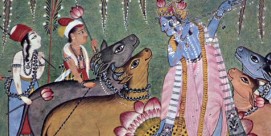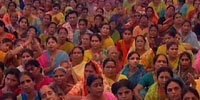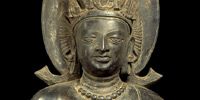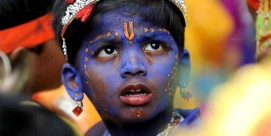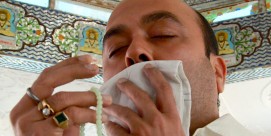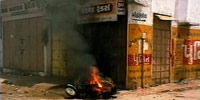FRED DE SAM LAZARO, correspondent: Last October, in a village not far from India’s capital, a 56-year-old Muslim man was beaten to death and his son gravely injured by an allegedly Hindu mob. His alleged crime? A rumor that he had butchered a cow, an animal considered sacred to Hindus. Mohammed Akhlaq’s home was ransacked, including the contents of the refrigerator, before the police arrived.
It was perhaps the most egregious in a spate of recent such incidents widely reported in the media. They have alarmed many in India’s liberal political establishment and especially leaders of the significant Muslim minority who fear a rising intolerance in this largely Hindu nation.
ASSADUDDIN OWAISI (All India Council of the Union of Muslims): The psyche that spawns an incident like this is against India’s secularism and brotherhood. It is thinking that looks down upon Muslims with distrust. This incident was not triggered by the beef issue; they murdered him on religious grounds.
DE SAM LAZARO: Whatever triggered the incident, “the beef issue” has been a political hot potato, one that’s endured even as the country has entered the globalized economy.
You won’t find beef in a Burger King anywhere in India, for example, or a McDonald’s. Here burgers come from sheep, chickens, even vegetables, but not cows. Paradoxically, the animals roam freely on the street—vulnerable to poisonous garbage and to being captured and taken to slaughter at night, though there are efforts to crack down on that illegal practice and to herd cows into shelters.
DEVENDER NAYAK (Magazine Editor): We don’t even believe that the cow is an animal. We see it as a manifestation of God. Our magazine tries to educate people about the Mother Cow, about the benefits of the cow.
DE SAM LAZARO: Hindus—80 percent of India’s 1.2 billion people—have long venerated the cow. It is the favorite animal of the deity Lord Krishna, and that reverence in turn is likely linked to the animal’s utility. Devender Nayak edits a magazine dedicated to improving awareness of the cow’s significance.
NAYAK: A poor family can sustain themselves with just one family of cows. They can sell the milk, use the dung and the urine, which has many medicinal properties.
DE SAM LAZARO: Whether that reverence should mean an outright ban on beef has been a vexing issue ever since independence in 1947 from the beef-loving British rulers. The father of modern India, a Hindu, professed his love for the cow, but Mahatma Gandhi said he would not impose his views on Muslims, Christians, as well as Hindus in some regions who do consume beef. Nonetheless, India’s constitution, while not outlawing cow slaughter, urges individual states to do so.
SHASHI THAROOR (Opposition Member of Parliament): India is a federal country, and so many states have gone ahead and outright banned cow slaughter.
DE SAM LAZARO: Shashi Tharoor is an author and member of the opposition Congress, the once-powerful party of Gandhi and Nehru. For years, under Congress rule, there was an accommodation of beef consumption in minority and many urban communities. But that changed with the election in 2014 of a Hindu nationalist Bharatiya Janata Party or BJP, led by charismatic Prime Minister Narendra Modi.
THAROOR: The BJP has essentially encouraged a more proactive and aggressive form of Hindu chauvinism, as a result of which the authorities’ zeal in voicing public disapproval of beef eating has suddenly created political tensions in our society. That’s the sort of polarization that could be deeply damaging to India’s stability in its future, and what many of us, who are not particularly fond of beef, still rail against. I’m a vegetarian myself.
DE SAM LAZARO: In a recent speech in Parliament, Tharoor said the frequent reports of vigilante groups targeting minorities, of rising intolerance, is coming at the cost of India’s reputation.
THAROOR: A Bangladeshi friend of mine who was visiting Delhi last week and he told me that Islamic fundamentalists in his country were having a field day attacking India as a place where it is safer to be a cow than a Muslim.
DE SAM LAZARO: Is that a bit of hyperbole?
THAROOR: It is a bit of hyperbole. It was a line used in a speech in Parliament—to good effect, I am pleased to say. But then at the same time I should stress that obviously it’s not meant to be taken literally. What I wanted people on the ruling party’s benches to realize is that it’s their conduct that has enabled critics of India to say things like this. And I think that it’s high time that the government realize that they’re making asses of themselves and discrediting an enormously plural and diverse civilization.
DE SAM LAZARO: For his part, Prime Minister Modi, though allied with Hindu nationalist groups, has not involved himself in their key demand: that India declare itself a Hindu nation. Modi has stuck to the pro-business economic development theme he’s struck ever since ascending to office.
PRIME MINISTER NARENDRA MODI: Hindus, decide if you want to fight against Muslims or fight against poverty. Muslims, decide whether you want to fight against Hindus or against poverty. Our country can only prosper if Hindus and Muslims unite to fight against poverty and we defeat poverty.
DE SAM LAZARO: Coming several days after the murder of Mohammed Akhlaq, Modi was criticized for saying too little too late and for not reining in vigilante groups and some members of his party who made statements appearing to support them. It turns out, by the way, that the meat found in Akhlaq’s refrigerator was not beef, but mutton. But Modi’s supporters say it is the opposition that is using divisive religion politics for their own gain.
MUKHTAR ABBAS NAQVI (Minister for Minority Affairs): The prime minister has repeatedly said that if the country should remain united everyone will have to walk hand in hand for development. But there are certain politicians that promote pseudo-secularism and are not ready to hear his message.
DE SAM LAZARO: The key question is whether the so-called “beef issue” represents the normal ebb and flow of a vibrant, if sometimes violent, democracy or whether that democracy, in fact, faces a new real threat.
For Religion & Ethics NewsWeekly, this is Fred de Sam Lazaro in New Delhi.

